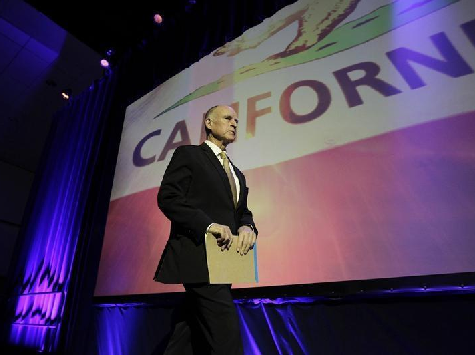
On Thursday, Governor Brown and legislative leaders of both parties announced that an agreement had been reached to place a “Rainy Day Fund” measure on this November’s ballot.
As described by the Wall Street Journal, “The deal announced Thursday would increase deposits to the fund when capital-gains-tax income jumps, and require payments to cut California’s sizable debt. It would also require that 1.5% of general-fund revenue go to the fund annually… “
Notable about the bipartisan deal struck on what is largely Governor Brown’s proposal, with a few tweaks, is the speed with which the deal came together, and the absence of a protracted political battle between Democrats and Republicans — something that typically rears its head on high-profile issues that require a 2/3 supermajority vote in the legislature.
In order for the legislature to place a measure on the ballot, it requires a two-thirds vote in both the State Senate and the Assembly. Based on the outcome of the 2012 elections, Democrats actually won supermajorities and could have been in a position to place a rainy day fund measure on the ballot without consulting with or obtaining votes from Capitol Republicans. However, the ethics scandals that have roiled the State Senate have led to three Democratic Senators having their voting privileges suspended — and thus leaving the majority party two votes shy of a two-thirds threshold.
Why was there such quick consensus on this rainy day fund measure? Anthony York, a former newspaper reporter and respected political analyst posits over at the Fox and Hounds Daily that this deal marks a cultural shift in the State Capitol, noting how bipartisan deals, without big fights, have been rare in the Capitol. He ponders openly the potential reasons for what he calls a cultural shift: “Maybe it’s the end of the era of deficits. Perhaps the years in the political wilderness have prompted a change in GOP tactics. Maybe it’s the different mix of personalities of the legislative leaders and the governor. Or maybe it’s the fact that this team of five leaders has had a chance to work together for more than three years.”
In looking to why a deal came together so quickly, one should look to the fact that Republicans barely have any leverage. Democrats still have a super-majority lock on the Assembly, and with only two GOP votes needed in the upper house, Senate GOP Leader Bob Huff’s ability to negotiate or demand more concessions was only as strong the two weakest members of his caucus.
It is anticipated that when legislators return to the State Capitol next week, they will cast the votes to place this on the ballot.
It is worth mentioning that this rainy day fund proposal, though relatively modest, represents a degree of fiscal conservativeness that is not typical of the California legislature. So it may be more eyebrow raising that Democratic leaders are heralding this deal. That said, the deal does represent a compromise of sorts by Republicans who were clearly more supportive of a rainy day fund measure that had been placed on the ballot as part of a previous budget deal brokered by then Governor Arnold Schwarzenegger. However, that proposal has not enjoyed the support of Democrats who have used their power, with a majority vote, to postpone that tougher measure (presumably they could have done this in perpetuity). This deal would substitute this new, more modest Brown-brokered proposal in the place of the previous Schwarzenegger-driven measure.

COMMENTS
Please let us know if you're having issues with commenting.